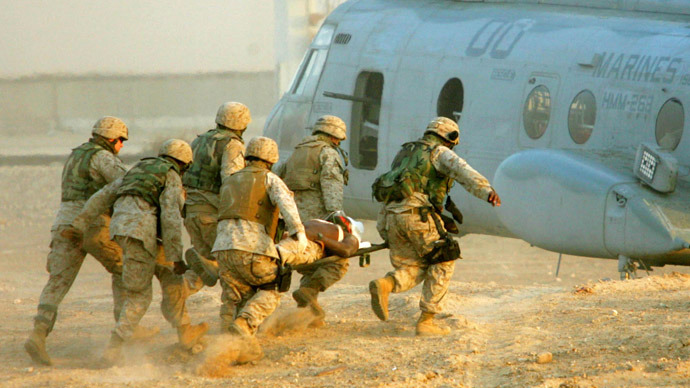And the rest, 991/3%, can't even Sacrifice in paying for the wars let alone, DeJa-Vu all over again,the long term results from and their responsibility the VA!! But oh, just ask, they're so 'patriotic', more like 'Poser Patriotism', cheap and easy!
August 05, 2014 - Psychiatrists might ask, “Why should I care?” The question is a reasonable one and the place where we will start. Each of you is a scarce resource to our larger society. If your bandwidth is like mine, it fills fast and has limits on what it can digest and act upon. So allow me to suggest a few reasons—by no means an exhaustive list—why what’s happening in the mental health world of the military and veterans is of great interest to you.
1. The local impact of the past 13 years of armed conflict is greater than many think and much greater than simply the number of veterans in your practice or your community
When speaking before groups, I have often started with a question: “How many Americans would you estimate have deployed to Iraq and Afghanistan since September 11, 2001?” Mostly I get a few bashful guesses. Seldom does more than one person offer an estimate much higher than 500,000.
Sometimes there are gasps when these audiences hear that well over 2.5 million Americans have deployed about 3.5 million times. This number, as large as it is, hints at another challenging fact: only about two-thirds of a percent of all Americans have deployed to these conflicts. For most American families, their only direct exposure to the US military is in an airport.
A closer look shows that the deployment figures are large but the impacts of these wars are larger still. Consider this: In 2008 Nobel Laureate economist Joseph Stiglitz1 and colleague Linda Bilmes estimated the cost of the Iraq War alone at between $2 trillion and $5 trillion (a broad potential range based on how the economic impact of some factors are valued, but striking even if the most conservative estimate is used). Can these figures be credible? As the US entered the Vietnam War in the early 1960s, there were still Americans receiving compensation for Civil War health effects. It is this lengthy economic tail—some resulting from direct benefits and compensation but perhaps mostly the consequence of more insidious long-term health effects on individual productivity—that is the major driver of the costs of war.
AUG. 7, 2014 - Most veterans who had persistent post-traumatic stress a decade or more after serving in the Vietnam War have shown surprisingly little improvement since then, and a large percentage have died, a new study finds, updating landmark research that began a generation ago. Members of minorities who enlisted before finishing high school were especially likely to develop such war-related trauma, as were those veterans who had killed multiple times in combat, the study found.
The new analysis, financed by the Department of Veterans Affairs, is part of the first effort to track a large, nationally representative sample of service members through their adult lives, and it is likely to have implications for post-traumatic stress treatment and disability-benefit programs for years to come, the authors said. Both issues have been hotly debated during the drawdown from the wars in Iraq and Afghanistan. read more>>>
Each war produces its own mental syndrome, whether the partial paralysis known as shell shock after World War I, or the numbed exhaustion that was called combat fatigue after World War II. But it was the first installment of this historic V.A. study — the National Vietnam Veterans Readjustment Study, published in 1992 — that put PTSD on the map as the signature mental injury of that war, prompting the government to invest heavily in the treatment of traumatized veterans and payment of disability benefits. It also set off a furious debate over the prevalence of the disorder, its definition and appropriate treatment that continues to this day.
snip The death rates are not a matter of debate. About two in 10 of the veterans who participated in the landmark study at the beginning, in the 1980s, died prematurely, by retirement age. Those with lifetime PTSD were twice as likely to have died than those who did not have the disorder, their lives often claimed by the rough hand of a life on the margins: injuries, accidents, suicide and homicide.
“These are the costs of war, over a lifetime,” read more>>>
























No comments:
Post a Comment